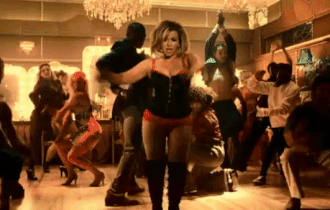Released: 26th September 2005
Writers: Charlotte Church / Eg White / Wayne Hector
Peak position: #10
Chart run: 10-18-23-24-34-43-45-56-72
Charlotte Church had successfully repositioned herself as a pop star landing a top five single and album, albeit with a fair amount of compromise over the look and sound of the campaign. But with a writing credit on Call My Name, was this our first real glimpse at how things were supposed to go?

There was never really any doubt that Charlotte Church would have little trouble reinventing herself as a pop star. For better or worse, she was already a fixture of the tabloids, generating reams of headlines about her personal life, her partying antics and outspoken personality that was many things but rarely diplomatic. Thus, the release of Crazy Chick was never going to fly under the radar; it generated a lot of interest, and there was a genuine curiosity as to how this genre-swap was going to work for Charlotte Church. However, it soon became evident that her vision for the album – Tissues and Issues – was markedly different from Sony BMG’s. After presenting them with the material she’d been working on, the label hurriedly sourced some additional tracks to bolster what was a surprisingly mellow collection of songs, most of which went on to be released as singles. So, ironically, on what was her mainstream debut and an opportunity to express herself, Charlotte Church had all but been silenced. Call My Name is the exception to that rule as it’s the one single she co-wrote and thus possibly the most revealing of the campaign.

The track adopts a vaudeville-esque approach somewhere between the Spice Girls’ The Lady Is A Vamp and Christina Aguilera’s Back To Basics (indeed, it wouldn’t have sounded remotely out of place on the latter), which works really well. The retro influence is apparent, but the inclusion of a growling synth bassline ensures that Call My Name still has its finger on the pulse and doesn’t veer into pastiche. Presenting the song in this way allows it to deal with its subject matter – sex – in a manner that doesn’t feel as uncomfortable as it could have. Charlotte Church had long been the subject of a media fixation that treated puberty as if it was an entirely new discovery. Photos of her chest were captioned ‘she’s a big girl now’, she won the ‘coveted’ Rear of the Year award in 2002 (aged 16), and those are just examples of the least unsavoury commentary. So, even though Charlotte Church was a young woman in a long-term relationship, the fact that she had grown up in the public eye and been objectified as a pricktease made it difficult to know how to approach the topic of sex.

Thus, Call My Name had to set the tone. And it does so by sending up the whole thing as a brash, theatrical affair rather than exploring it as a gratuitous confessional. Every vaguely intimate moment (“I like the sound of your heart-stopping, of lip-locking, the grazing of knees, yeah; I like the sound of skin touching, hands fumbling, you do as you please”) is counterbalanced with something that sounds like it would be played for laughs in a rom-com: “I like the sound of back on the wall, yeah, shelves falling, oh yes indeed”. Call My Name fully embraces the fun and frivolity of sex while skilfully eschewing any awkwardness that might have existed.

Vocally, Charlotte Church sounds much more comfortable here. There were undoubtedly still going to be people expecting an octave-spanning performance, but it’s hard to imagine how that would fit. Instead, the song utilises her lower register, which is brimming with personality. Charlotte Church is entirely in control, and in places, it’s almost a bit cabaret as things get cheekily risqué: “I like the sound of your hand slapping, your whip cracking, this could be painful”. Even the chorus: “Yeah I love it when you call my NA-A-A-AME, NUH-NUH-NAME”,is begging for a flurry of jazz hands. Call My Name is enjoyably bawdy and really gives a sense of the world that Charlotte Church had been around as a performer. And its core, that really is the appeal of this song. It all boils down to the fundamental difference between a song written for her and one written by her.

Although Crazy Chick played things a little more safely, the music video for Call My Name firmly removes the training wheels and, in doing so, is surely closer to what was envisaged when Charlotte Church announced she was launching a pop career. The musicality within the song is perfectly mirrored with a backstage burlesque theme where she performs in her dressing room with a large ensemble of extras. Having been told it’s three minutes until showtime, there’s a fabulous shot where she looks around and says: “Thanks, love!” in a broad Welsh accent, which is so quintessentially unassuming. By framing the video as Charlotte Church preparing to put on a show, it permits her to express sexuality – which the red-trimmed basque and knee-high boots unquestionably do – without requiring her to try and act sexually. It could almost pass for dress-up and yet, still pushes the envelope enough to raise eyebrows. The sequence where she’s lying surrounded by semi-naked torsos gyrating in unison is brilliantly choreographed and filmed entirely tastefully while still titillating enough to generate headlines (which it did, of course). The video concludes with Charlotte Church heading for the stage, drum strapped to her back, ready to put on a one-woman show, which could scarcely be a more fitting metaphor of a woman whose entire life was treated as public property.

Call My Name peaked at #10 in the UK, which was a reasonably modest showing for what was ostensibly Charlotte Church’s second single. However, releasing the album so early in the campaign was always likely to result in diminishing returns for anything that followed. Nonetheless, five weeks in the top 40 was a pretty standard trajectory for a song that grazed the top ten in 2005. Perhaps a better measure of success would be the single’s impact on Tissues and Issues. Having sunk as low as #61, it rebounded up to #22, which is impressive considering Call My Name doesn’t necessarily come across as an obvious album-selling song. It just shows that there was lingering interest in the album, and with the right singles, it could quickly be translated into sales.

It’s entirely understandable that Charlotte Church might have felt frustrated at her contributions to Tissues and Issues being dismissed when this track was ample proof that she could co-write a hit. Indeed, you can almost see the cracks appearing and the discord between the material she wanted to create versus the image Sony BMG wished to court. The irony is that Call My Name represents a perfect marriage of the two. It’s an enjoyable romp of a song with stacks of commercial potential, which does so while permitting Charlotte Church some creative input. Rather than veer from one extreme to the other, perhaps this should have been the template upon which Tissues and Issues was based all along.



